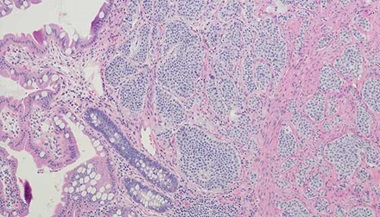Lynch Syndrome
Also known as hereditary nonpolyposis colorectal cancer (HNPCC) syndrome, Lynch syndrome was first described more than 100 years ago. It is the most common of the recognized inherited colon and rectal cancer syndromes.
Lynch Syndrome Symptoms
Many patients with colon or rectal cancer experience no symptoms in the early stages of the disease. Symptoms may not appear until the disease has progressed to an advanced stage. Routine screening and understanding the risk factors will help safeguard your health.
The symptoms of colon cancer and rectal cancer are similar to the symptoms of other colon diseases. Common symptoms include the following:
- Bloody stool
- Unexplained diarrhea
- A long period of constipation
- Abdominal cramps
- Decrease in size or caliber of stool
- Gas pain, bloating, fullness
- Unexplained weight loss
- Lethargy and vomiting
If you experience these symptoms, consult your physician for a proper diagnosis.
Lynch Syndrome Diagnosis
Early diagnosis is crucial for early detection and treatment of colon and rectal cancers. Your schedule for regular screenings depends on your family and medical history.
Individuals at risk for Lynch syndrome usually have a family history of two successive generations of colon or rectal cancer. Or they have at least one generation with colon or rectal cancer and one generation with polyps.
Men and women at risk need a colon examination. Women should also have yearly endometrial and ovarian screenings. Your doctor will work with you to determine your specific examination guidelines.
Diagnostic procedures for Lynch syndrome include the following:
Genetic Testing
Mutations, or changes, in one of five different genes are responsible for most cases of Lynch syndrome. If you have a family history of Lynch syndrome, you can have a genetic test to determine whether you are at risk for developing cancer.
A genetic test is performed by obtaining a small blood sample. If your test confirms that you have the gene mutation, you should schedule annual colonoscopies and get regular screenings. If you do not have the mutation, you can avoid unnecessary examinations.
Microsatellite Instability Testing and Immunohistochemistry Testing
Microsatellite instability testing and immunohistochemistry testing are used as a screening test to see how likely it is that your cancer was caused by one of the Lynch syndrome genes. If your test was positive, then the cancer may be due to a gene mutation, and you can pursue genetic blood testing.
Colonoscopy
A colonoscopy is the preferred method for diagnosing Lynch syndrome. It is the best way to detect polyps or cancer and allows your doctor to see the entire bowel. Your colon must be clear of stool to allow good visibility. Preparations may include a liquid diet, an enema and laxatives. Patients are sedated before the procedure.
During a colonoscopy:
- Your doctor inserts the colonoscope through the rectum and into the anus and large intestine to check for cancer or polyps.
- Biopsy forceps may be inserted through the scope to remove a small sample of tissue for further analysis.
- If there is a polyp, it can be removed through the colonoscope.
- You may experience some cramping or discomfort.
Lynch Syndrome Treatment
Your treatment will depend on the findings during the examination. Your doctor may be able to remove the polyps endoscopically, or surgery may be recommended. Learn more about Lynch syndrome treatment.





